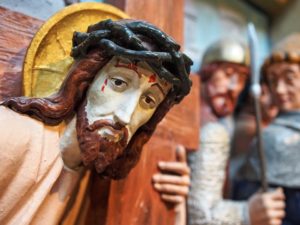Who was Judas Iscariot? Did Judas betray Jesus, or are there other understandings of the story?
In the canonical Gospel According to John, Jesus says: ““This is my commandment, that you love one another as I have loved you. No one has greater love than this, to lay down one’s life for one’s friends. You are my friends if you do what I command you” (John 15:12-14). If the greatest act of love is to lay down one’s life for one’s friends, what act is most strongly opposed to love? Perhaps it is betrayal– to lay one’s friend for one’s own life.
When you think of betrayal, who do you think of? Perhaps you think of Benedict Arnold’s betrayal of America, or the betrayal of Julius Caesar? For many people, they will have something different in mind: the betrayal of Jesus by Judas Iscariot. 
But what if there were more to the story? After all, in John 13, Jesus clearly knows what Judas is going to do and authorizes him to continue. John tells it in such a way that Satan literally “entered into” Judas (John 13:27), but this is far from universal– the gospel according to Luke reports Satan entering Judas, but there is no mention of this in the stories found in the gospels according to Matthew or Mark— both of which were before John and possibly before Luke.
Most early Christians did believe that Judas betrayed Jesus, of course. But what if there were early Christians who believed that, rather than betraying Jesus, Judas was the only one of the apostles who truly understood Jesus’ mission and helped him achieve it?
When scholars discovered the Gospel of Judas, the story they found shocked and troubled them. To this day, there are a variety of scholarly positions on how to understand this complex (and unfortunately fragmented) text. In this post, we’ll take a cursory dive into one position commonly held– that in this Gospel, Judas was not a betrayer, but was truly the only disciple who understood and helped carry out Jesus’ mission.
Click below to continue reading!
Table of Contents
Frustration with the Disciples
According to the Gospel of Judas, some people “walked in the way of righteousness”, but others “walked in their transgression”. Thus, Jesus performed signed and wonders to help save humanity, calling the twelve apostles to help him in his mission… with varying degrees of their midst. Jesus would try to tell them about transcendent mysteries and about the end of the world, but the disciples often failed to understand. Jesus would even alter his appearance (a practice found in other non-canonical gospels– sometimes to hilarious ends— and also in the canonical gospels, such as in the walk to Emmaus).
 That being said, Jesus was constantly frustrated with them. For example: the Gospel of Judas reports that Jesus found them sitting together “practicing their piety”– sitting around and praying over their bread. Jesus found this ridiculous and laughed at them!
That being said, Jesus was constantly frustrated with them. For example: the Gospel of Judas reports that Jesus found them sitting together “practicing their piety”– sitting around and praying over their bread. Jesus found this ridiculous and laughed at them!
When the disciples asked why, Jesus explained– “I’m not laughing at you. You’re not doing this because you want to, but because through this your God [will be] praised.”
Jesus explained– “I’m not laughing at you. You’re not doing this because you want to, but because through this your God [will be] praised.”
The disciples proceeded to get angry at this and began to “curse him in their hearts”. And what are we to make of Jesus saying this? Readers of this blog will likely understand what I mean when I say that, for many “gnostic” Christians– such as the Sethians, who likely wrote the Gospel of Judas– the God of Jesus was not the god of the Old Testament. Rather, that god– the god of the Old Testament– is the Demiurge, a pretender who declares himself to be God but in reality is only a second-rate deity.
For Jesus, then, the disciples were worshiping the Demiurge which was clearly not what Jesus wanted them to do! In fact, when Jesus challenged the disciples about their worship of the Demiurge, only Judas Iscariot was strong enough to look reality in the eye and recognize that Jesus was not the son of the Demiurge, but of the true God.
This wasn’t the end of it. The disciples shared a dream in which an altar of God was being profaned. Jesus told them that they, themselves, profaned the altar of God by sacrificing animals and leading people to worship the Demiurge.
Judas as the True Disciple
After this happened, however, Judas pulled Jesus aside and asked that he be allowed to share a dream that he had. Judas reports that the other disciples were chasing him and trying to stone him, so he fled to the house of the true God. Jesus advised him that he had been led astray, however, because “no person of mortal birth is worthy to enter the house you’ve seen, because that place is reserved for those who are holy”.
Jesus explains to Judas that there exists a “holy generation” which Judas will be caught into, and though he will be cast out of the band of the disciples, he will “become the thirteenth”, and those who continue in service of the Demiurge will curse him.
Jesus then explained to Judas several transcendent secrets about the universe. If you want to learn more about those, check out this post about the secret teachings in the Gospel of Judas!
Did Judas Betray Jesus?
Jesus tells Judas that, for his plan of bringing salvific knowledge to humanity to come to fruition, he must reveal the Demiurge for who he is– a false deity who demands sacrifices– and Jesus must show the way to the true God. 
He encourages Judas not to worry because he would not actually be tortured– the person Jesus would be tortured on the cross, but Christ himself would not. That’s because, similar to what we find in other “gnostic” texts like the Gospel of Philip, the idea is that the spirit of Christ, the true son of God, dwells within Jesus, and leaves before his crucifixion. That’s because Jesus is a flesh-and-blood mortal, while Christ is a transcendent being. This is another topic that merits significant greater diving; look forward to a blog post, soon.
After receiving his instructions, the gospel of Judas reports that Judas “looked up and saw the luminous cloud, and he entered it”, where God’s power takes him to the high priests. They asked Judas, “What are you doing here? Aren’t you Jesus’ disciple?” Judas, fulfilling Christ’s commandment, then told them how to find Jesus. So did Judas betray Jesus? In this story, he did not!
Who Is Judas?
So, then, who is Judas? The Gospel of Judas would challenge us to think differently about him. Of course, there are different perspectives– excellent scholars like April DeConick have challenged this reading, instead proposing that the Judas depicted in this work should be understood as a servant of the Demiurge. It’s complicated!
And yet, at least in this reading, we see a fascinating approach to the crucifixion. After all, isn’t it a problem if the true God committed human sacrifice– no less of his own son? Surely that can’t be morally permissible? Of course, there are defenses of this kind of atonement theory, such as this one that hilariously asserts “God didn’t sacrifice Jesus. Rather, Jesus, as God incarnate, sacrificed Himself”. Right. I’m not sure how a committed Trinitarian can say that Jesus did something which God didn’t. But we’ll leave the canonical stuff for another blog!
In the Gospel of Judas, we see a lot going on. This blog post has focused less on the transcendent mysteries revealed to Judas, and more on the role he played in the narrative– and how this narrative challenges widely held assumptions about Judas’ identity. But part of what makes this gospel fascinating is its allegation that Judas did betray Jesus– but rather that he was the only one who understood Jesus’ mission.
What do you think? What questions do you have? Where would you like to see us dive deeper? Feel free to let us know in the comments!

4 thoughts on “Did Judas Betray Jesus, or Are We Completely Deceived?”